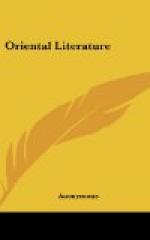Meskin Aldaramy.
[6] These lines are also from the Hamasa.
ON TEMPER[7]
Yes, Leila, I swore by the fire of thine
eyes,
I ne’er could a sweetness
unvaried endure;
The bubbles of spirit, that sparkling
arise,
Forbid life to stagnate and
render it pure.
But yet, my dear maid, tho’ thy
spirit’s my pride,
I’d wish for some sweetness
to temper the bowl;
If life be ne’er suffer’d
to rest or subside,
It may not be flat, but I
fear ’twill be foul.
Nabegat Beni Jaid.
[7] There have been several Arabian poets of
the name of Nabegat. The
author of these verses
was descended from the family of Jaid. As
he died in the fortieth
year of the Hegira, aged one hundred and
twenty, he must have
been fourscore at the promulgation of Islamism;
he, however, declared
himself an early convert to the new faith.
THE SONG OF MAISUNA[8]
The russet suit of camel’s hair,
With spirits light, and eye
serene,
Is dearer to my bosom far
Than all the trappings of
a queen.
The humble tent and murmuring breeze
That whistles thro’
its fluttering wall,
My unaspiring fancy please
Better than towers and splendid
halls.
Th’ attendant colts that bounding
fly
And frolic by the litter’s
side,
Are dearer in Maisuna’s eye
Than gorgeous mules in all
their pride.
The watch-dog’s voice that bays
whene’er
A stranger seeks his master’s
cot,
Sounds sweeter in Maisuna’s ear
Than yonder trumpet’s
long-drawn note.
The rustic youth unspoilt by art,
Son of my kindred, poor but
free,
Will ever to Maisuna’s heart
Be dearer, pamper’d
fool, than thee.
[8] Maisuma was a daughter of the tribe of Calab;
a tribe, according
to Abulfeda, remarkable
both for the purity of dialect spoken in
it, and for the number
of poets it had produced. She was married,
whilst very young, to
the Caliph Mowiah. But this exalted situation
by no means suited the
disposition of Maisuna, and amidst all the
pomp and splendor of
Damascus, she languished for the simple
pleasures of her native
desert.
TO MY FATHER[9]
Must then my failings from the shaft
Of anger ne’er escape?
And dost thou storm because I’ve
quaff’d
The water of the grape?
That I can thus from wine be driv’n
Thou surely ne’er canst
think—
Another reason thou hast giv’n
Why I resolve to drink.
’Twas sweet the flowing cup to seize,
’Tis sweet thy rage
to see;
And first I drink myself to please;
And next—to anger
thee.
Yezid.




